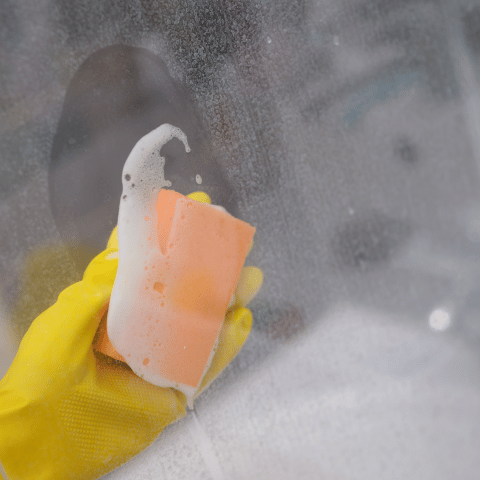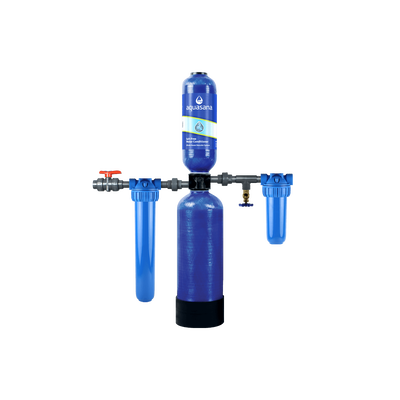What is hard water?
Hard water contains high levels of dissolved minerals, primarily calcium and magnesium. These minerals are naturally picked up as water travels through soil and rock, but aren’t noticeable to the naked eye.
The degree of hardness in water is usually measured in grains per gallon (GPG) or milligrams per liter (mg/L). Water with more than 7 GPG is considered hard, while water above 10.5 GPG is classified as very hard.
How to tell if you have hard water
A U.S. Geological Survey estimates that 85% of American homes have hard water, so it’s more likely than not that your home has hard water. Some areas also have harder water than others, so you can check our list of the top 10 U.S. cities with the hardest water to see if you live in an area where water is especially hard. However, the most accurate way to see if you have hard water is by checking your water quality report or doing a water hardness test. For a quick check, you can also see look for these common signs of hard water:
- Chalky or mineral-like taste in drinking water
- Soap scum or residue on sinks, tubs, and shower doors
- Spots or film on clean dishes and glassware
- Dry or itchy skin and dull hair after bathing
- Reduced lather from soaps and shampoos
- Scale buildup on faucets and showerheads
- Clothes that feel rough or look dingy after washing
- Reduced water pressure or pipe bursts
If you recognize any of these issues, it can indicate that you have hard water and be a sign that you need a water softener.

Is drinking hard water bad for you?
Generally speaking, drinking hard water isn't bad for your health. In fact, the calcium and magnesium found in hard water are essential minerals for your body and many people around the world consume hard water without experiencing any negative effects.
However, most of the minerals you get come from your diet, and the amount contributed by drinking hard water is negligible by comparison. According to the Vermont Department of Health, an 8-ounce glass of moderately hard water contains between 50-75 mg of calcium, whereas an 8-ounce glass of milk provides 300 mg of calcium. That means to get the recommended daily 1,000-1,200 mg of calcium from hard water — you’d need to drink around 16-18 glasses per day.
You shouldn’t rely on hard water as a primary source of minerals, but drinking it won’t have a negative effect on your health.
Health effects of hard water for your body
Drinking hard water doesn’t pose a health risk, and the dissolved calcium and magnesium it contains can contribute toward your daily intake of these minerals. There are also conflicting studies about the association of drinking hard water with a lower risk of cardiovascular disease, but there is no definitive conclusion.
However, hard water is associated with negative health effects for your skin and hair. The minerals in hard water are harsh on your skin, and can cause irritation, inflammation, and redness — especially if you have sensitive skin or a condition like eczema.
Hard water also strips your hair follicles of natural protective oils, leaving your hair dry and more prone to split ends and breakage. It’s also more susceptible to frizz and tangles, which can make it harder to style or manage throughout the day.
Hard water also doesn’t lather well, which reduces the effectiveness of your skin and hair products. You’ll find that shampoos, conditioners, cleansers, or body washes don’t work as well and are harder to rinse off.
Effects of hard water on your home
The main concern of hard water isn’t for your health, but rather your home. Hard water is bad for your pipes, appliances, dishes, and clothes which can make it worthwhile to invest in a water softener. Here’s some context about the issues hard water presents for your home:
- Clogs Pipes: The minerals in hard water form scale buildup in pipes, which reduces water pressure and can even lead to bursts.
- Reduces Appliance Lifespan: Hard water also forms buildup in your appliances that use water like washing machines and heaters, reducing their efficiency and lifespan.
- Leaves Residue on Dishes: After washing dishes, hard water leaves residue on dishes that appears as white spots, streaks, or a light film.
- Makes Cleaning Product Less Effective: Hard water doesn’t lather well with soap, requiring you to use more product when cleaning your home.
- Damages Clothes: Since hard water doesn’t lather well, detergent isn’t as effective and your clothes may appear dingy after a laundry cycle. Hard water also causes color to fade faster, and the minerals can cause tears in fabric.

Address hard water with an Aquasana water softener
Even if drinking hard water isn’t a health risk, there are plenty of benefits from using a water softener to address the issue. When choosing a water softener, make sure to size the softener based on your water hardness and usage.
Aquasana offers high-performance water softeners in 40k and 60k grain capacities to suit homes of different sizes, and our softeners are IAPMO certified to NSF/ANSI Standard 44 for the reduction of water hardness so you can trust that your water is being effectively softened. Compared to traditional softeners, ours also use 50% less salt and generate 28% less wastewater*, which makes them more cost-effective and eco-friendly.
Ready to get rid of hard water, shop our softeners or explore our full product selection to improve your water quality.
WHOLE HOUSE WATER SOFTENER
SimplySoft® 40,000 Grain Softener
Reduces minerals that cause hard water, providing softer, scale-free water from every tap in your home.
.png)
* Potential savings based on Water Quality Research Foundation Battelle Institute Study.
**Based on metered operation mode compared to standard time-based regenerated softeners.


